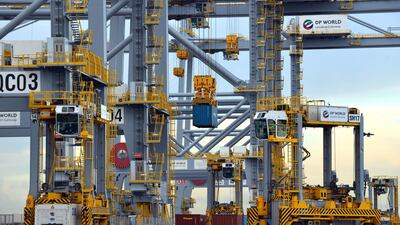DP World, the world’s fourth biggest port operator, is undeterred by developments in Djibouti and the company which recorded 7.3 per cent growth in 2017 net income, is looking for more investment opportunities in Africa.
“Africa is a very important market,” DP World’s group chairman and chief executive, Sultan Bin Sulayem said in Dubai on Thursday. “We know in Africa there are risks and like in any business there is nothing without risks but the opportunities are big. As a company, we are better positioned than many to invest in Africa.”
The Nasdaq Dubai-listed company, whose 2017 profitability was boosted by strong performance in its core regions - the Middle East, Europe and Africa; Asia Pacific and Indian subcontinent; and Australia and Americas – has faced some challenges in its African operations this year.
Last month, the port operator said Djiboutian authorities took control of the Doraleh Container Terminal from its fully-owned entity that designed, built and operated the terminal after winning the concession in 2006.
The company has subsequently commenced arbitration proceedings before the London Court of International Arbitration to protect its interests, it said in its February 23 statement.
Mr Bin Sulayem said Djibouti’s arbitrary move does not bode well for the country and continent.
“As far as Djibouti is concerned, what they have done is unfortunate. This is sad thing really… the action they have taken,” he said. “It will basically make it more difficult to attract investment in general and banks will be very careful in financing in Africa.”
Mr Bin Sulayem downplayed the headwinds in Republic of Somaliland, another African market where the company is investing to develop the Port of Berbera. The disagreement between the governments of Somalia and Somaliland has worsened. Somalia's lower house of Parliament rejected a tripartite deal by DP World to grant Ethiopia a 19 per cent stake in the port. Mogadishu contests the way the deal was struck, while Somaliland said it has the right to the enter into any commercial agreement.
“It doesn’t really concern us because Somali Parliament has no [jurisdiction],” he said of the parliamentary vote this week in his first public remarks on the ongoing tiff between the two African governments. “They can only make noise and they can only make statements but actually on the ground Berbera [Somaliland] has agreements with many countries around the world, with many companies and it is within their laws.”
________________
Read more:
DP World handles 10% more volume in 2017, has bullish outlook for 2018
DP World partners with infrastructure fund to invest $3bn in India
DP World expects 10% growth in 2017 gross container volumes
________________
Within Africa, DP world is looking at Kenya for investment opportunities and is awaiting Kenyan government’s decision to privatise Mombasa port facilities. Ports in war-torn Yemen are also on DP world’s radar and it would look at expansion possibilities once the country is safe enough for operations, he said.
"As a company they did really well as in any business sometimes expansion efforts work and sometimes they don’t. DP World has successfully expanded its business in many geographies and became a global player," said Tariq Qaqish, managing director of asset management at Dubai-based financial services firm Menacorp. "Africa does have the potential of growth and if you have support of African governments the rewards are there. I think in each market there has to be evaluated individually."
The company earlier on Thursday said its full-year profit attributable to shareholders before separately disclosed items climbed to $1.2 billion on the back of market share gain and strong volume growth in its global portfolio.
Improvement in global trade is expected to keep the company growing "ahead of the market” as contributions from new developments rise in 2018, the company said in a bourse filing. DP world recorded a year-on-year 15.1 per cent growth in net income on a like-for-like basis at constant currency. Its revenue for the period advanced 13.2 per cent to $4.7bn, while cash from operating activities for the period also climbed to $2.4bn, up from $2bn recorded at the end of 2016, it said.
“Our significant cash generation and investment partnerships, leave us with a strong balance sheet and flexibility to capitalise on the growth opportunities in the industry and deliver enhanced shareholder value over the long term,” Mr Bin Sulayem said.
“We have made an encouraging start to the year with current trading in line with expectations. As we look ahead into 2018, geopolitical headwinds in some regions pose a challenge but we expect to continue to grow ahead of the market and see increased contributions from our recent investments.”
Port operators globally struggled to maintain profitability in the first half of 2017 as global trade expansion was crimped by slower economic growth. Economic activity and trade momentum picked up in the latter half of 2017 as oil prices rose, helping companies such as DP world to improve their growth forecast on the back of increased gross container volumes.
DP World handled 10.1 per cent more in gross container volumes on a reported basis in 2017 and expects the volume expansion to continue in 2018. The company handled 70.1 million twenty-foot equivalent units (TEUs) last year amid broad-based growth across all regions. In the UAE, the company handled 15.4 million TEUs in 2017, up by 4 per cent year-on-year, it said in a February statement.
Beyond Africa, the company is committed to investments in India and is evaluating a deal in Russia, he said without giving the size of potential investment in or the timeline of Russian deal.


